- Home
- Neil Gaiman
Fragile Things Page 12
Fragile Things Read online
Page 12
“Not all of it. And he is going to do something about it, when he realizes there’s nothing to be done, because he’s all paralyzed, there’s fugu fish and toad skin and ground bone and everything else in that powder, and he’s breathed it in.
“They take him down to emergency, where they don’t do much for him, figuring him for a street rat with a drug problem, and by the next day he can move again, although it’s two, three days until he can speak.
“Trouble is, he needs it. He wants it. He knows there’s some big secret in the zombie powder, and he was almost there. Some people say they mixed heroin with it, some shit like that, but they didn’t even need to do that. He wants it.
“And they told him they wouldn’t sell it to him. But if he did jobs for them, they’d give him a little zombie powder, to smoke, to sniff, to rub on his gums, to swallow. Sometimes they’d give him nasty jobs to do no one else wanted. Sometimes they just humiliate him because they could—make him eat dog shit from the gutter, maybe. Kill for them, maybe. Anything but die. All skin and bones. He do anything for his zombie powder.
“And he still thinks, in the little bit of his head that’s still him, that he’s not a zombie. That he’s not dead, that there’s a threshold he hasn’t stepped over. But he crossed it long time ago.”
I reached out a hand, and touched her. Her body was hard, and slim, and lithe, and her breasts felt like breasts that Gauguin might have painted. Her mouth, in the darkness, was soft and warm against mine.
People come into your life for a reason.
4. “Those people ought to know who we are and tell that we are here”
When I woke, it was still almost dark, and the room was silent. I turned on the light, looked on the pillow for a ribbon, white or red, or for a mouse-skull earring, but there was nothing to show that there had ever been anyone in the bed that night but me.
I got out of bed and pulled open the drapes, looked out of the window. The sky was graying in the east.
I thought about moving south, about continuing to run, continuing to pretend I was alive. But it was, I knew now, much too late for that. There are doors, after all, between the living and the dead, and they swing in both directions.
I had come as far as I could.
There was a faint tap-tapping on the hotel room door. I pulled on my pants and the T-shirt I had set out in and, barefoot, I pulled the door open.
The coffee girl was waiting for me.
Everything beyond the door was touched with light, an open, wonderful predawn light, and I heard the sound of birds calling on the morning air. The street was on a hill, and the houses facing me were little more than shanties. There was mist in the air, low to the ground, curling like something from an old black-and-white film, but it would be gone by noon.
The girl was thin and small; she did not appear to be more than six years old. Her eyes were cobwebbed with what might have been cataracts, her skin was as gray as it had once been brown. She was holding a white hotel cup out to me, holding it carefully, with one small hand on the handle, one hand beneath the saucer. It was half-filled with a steaming mud-colored liquid.
I bent to take it from her, and I sipped it. It was a very bitter drink, and it was hot, and it woke me the rest of the way.
I said, “Thank you.”
Someone, somewhere, was calling my name.
The girl waited, patiently, while I finished the coffee. I put the cup down on the carpet, then I put out my hand and touched her shoulder.
She reached up her hand, spread her small gray fingers, and took hold of my hand. She knew I was with her. Wherever we were headed now, we were going there together.
I remembered something somebody had once said to me. “It’s okay. Every day is freshly ground,” I told her.
The coffee girl’s expression did not change, but she nodded, as if she had heard me, and gave my arm an impatient tug. She held my hand tight with her cold cold fingers, and we walked, finally, side by side into the misty dawn.
OTHER PEOPLE
“Time is fluid here,” said the demon.
He knew it was a demon the moment he saw it. He knew it, just as he knew the place was Hell. There was nothing else that either of them could have been.
The room was long, and the demon waited by a smoking brazier at the far end. A multitude of objects hung on the rock-gray walls, of the kind that it would not have been wise or reassuring to inspect too closely. The ceiling was low, the floor oddly insubstantial.
“Come close,” said the demon, and he did.
The demon was rake thin and naked. It was deeply scarred, and it appeared to have been flayed at some time in the distant past. It had no ears, no sex. Its lips were thin and ascetic, and its eyes were a demon’s eyes: they had seen too much and gone too far, and under their gaze he felt less important than a fly.
“What happens now?” he asked.
“Now,” said the demon, in a voice that carried with it no sorrow, no relish, only a dreadful flat resignation, “you will be tortured.”
“For how long?”
But the demon shook its head and made no reply. It walked slowly along the wall, eyeing first one of the devices that hung there, then another. At the far end of the wall, by the closed door, was a cat-o’-nine-tails made of frayed wire. The demon took it down with one three-fingered hand and walked back, carrying it reverently. It placed the wire tines onto the brazier, and stared at them as they began to heat up.
“That’s inhuman.”
“Yes.”
The tips of the cat’s tails were glowing a dead orange.
As the demon raised its arm to deliver the first blow, it said, “In time you will remember even this moment with fondness.”
“You are a liar.”
“No,” said the demon. “The next part,” it explained, in the moment before it brought down the cat, “is worse.”
Then the tines of the cat landed on the man’s back with a crack and a hiss, tearing through the expensive clothes, burning and rending and shredding as they struck, and, not for the last time in that place, he screamed.
There were two hundred and eleven implements on the walls of that room, and in time he was to experience each of them.
When, finally, the Lazarene’s Daughter, which he had grown to know intimately, had been cleaned and replaced on the wall in the two hundred and eleventh position, then, through wrecked lips, he gasped, “Now what?”
“Now,” said the demon, “the true pain begins.”
It did.
Everything he had ever done that had been better left undone. Every lie he had told—told to himself, or told to others. Every little hurt, and all the great hurts. Each one was pulled out of him, detail by detail, inch by inch. The demon stripped away the cover of forgetfulness, stripped everything down to truth, and it hurt more than anything.
“Tell me what you thought as she walked out the door,” said the demon.
“I thought my heart was broken.”
“No,” said the demon, without hate, “you didn’t.” It stared at him with expressionless eyes, and he was forced to look away.
“I thought, now she’ll never know I’ve been sleeping with her sister.”
The demon took apart his life, moment by moment, instant to awful instant. It lasted a hundred years, perhaps, or a thousand—they had all the time there ever was, in that gray room—and toward the end he realized that the demon had been right. The physical torture had been kinder.
And it ended.
And once it had ended, it began again. There was a self-knowledge there he had not had the first time, which somehow made everything worse.
Now, as he spoke, he hated himself. There were no lies, no evasions, no room for anything except the pain and the anger.
He spoke. He no longer wept. And when he finished, a thousand years later, he prayed that now the demon would go to the wall, and bring down the skinning knife, or the choke-pear, or the screws.
“Again,” said the de
mon.
He began to scream. He screamed for a long time.
“Again,” said the demon, when he was done, as if nothing had been said.
It was like peeling an onion. This time through his life he learned about consequences. He learned the results of things he had done; things he had been blind to as he did them; the ways he had hurt the world; the damage he had done to people he had never known, or met, or encountered. It was the hardest lesson yet.
“Again,” said the demon, a thousand years later.
He crouched on the floor, beside the brazier, rocking gently, his eyes closed, and he told the story of his life, re-experiencing it as he told it, from birth to death, changing nothing, leaving nothing out, facing everything. He opened his heart.
When he was done, he sat there, eyes closed, waiting for the voice to say, “Again,” but nothing was said. He opened his eyes.
Slowly, he stood up. He was alone.
At the far end of the room, there was a door, and as he watched, it opened.
A man stepped through the door. There was terror in the man’s face, and arrogance, and pride. The man, who wore expensive clothes, took several hesitant steps into the room, and then stopped.
When he saw the man, he understood.
“Time is fluid here,” he told the new arrival.
KEEPSAKES AND TREASURES
I am his Highness’ dog at Kew
Pray tell me, sir, whose dog are you?
ALEXANDER POPE,
On the Collar of a Dog Which I
Gave to His Royal Highness
You can call me a bastard if you like. It’s true, whichever way you want to cut it. My mum had me two years after being locked up “for her own protection”; this was back in 1952, when a couple of wild nights out with the local lads could be diagnosed as clinical nymphomania, and you could be put away “to protect yourself and society” on the say-so of any two doctors. One of whom was her father, my grandfather, the other was his partner in the north London medical practice they shared.
So I know who my grandfather was. But my father was just somebody who shagged my mother somewhere in the building or grounds of St. Andrews Asylum. That’s a nice word, isn’t it? Asylum. With all its implications of a place of safety: somewhere that shelters you from the bitter and dangerous old world outside. Nothing like the reality of that hole. I went to see it, before they knocked it down in the late seventies. It still reeked of piss and pine-scented disinfectant floor wash. Long, dark badly lit corridors with clusters of tiny, cell-like rooms off them. If you were looking for Hell and you found St. Andrews you’d not have been disappointed.
It says on her medical records that she’d spread her legs for anyone, but I doubt it. She was locked up back then. Anyone who wanted to stick his cock into her would have needed a key to her cell.
When I was eighteen I spent my last summer holiday before I went up to university hunting down the four men who were most likely to have been my father: two psychiatric nurses, the secure ward doctor, and the governor of the asylum.
My mum was only seventeen when she went inside. I’ve got a little black-and-white wallet photograph of her from just before she was put away. She’s leaning against the side of a Morgan sports car parked in a country lane. She’s smiling, sort of flirtily, at the photographer. She was a looker, my mum.
I didn’t know which one of the four was my dad, so I killed all of them. They had each fucked her, after all: I got them to admit to it, before I did them in. The best was the governor, a red-faced fleshy old lech with an honest-to-goodness handlebar mustache, like I haven’t seen for twenty years now. I garotted him with his Guards tie. Spit bubbles came from his mouth, and he went blue as an unboiled lobster.
There were other men around St. Andrews who might have been my father, but after those four the joy went out of it. I told myself that I’d killed the four likeliest candidates, and if I knocked off everyone who might have knocked up my mother it would have turned into a massacre. So I stopped.
I was handed over to the local orphanage to bring up. According to her medical records, they sterilized my mum immediately after I was born. Didn’t want any more nasty little incidents like me coming along to spoil anybody’s fun.
I was ten when she killed herself. This was 1964. I was ten years old, and I was still playing conkers and knocking off sweet shops while she was sitting on the linoleum floor of her cell sawing at her wrists with a bit of broken glass she’d got from heaven-knows-where. Cut her fingers up, too, but she did it all right. They found her in the morning, sticky, red, and cold.
Mr. Alice’s people ran into me when I was twelve. The deputy head of the orphanage had been using us kids as his personal harem of scabby-kneed love slaves. Go along with him and you got a sore bum and a Bounty bar. Fight back and you got locked down for a couple of days, a really sore bum and concussion. Old Bogey we used to call him, because he picked his nose whenever he thought we weren’t looking.
He was found in his blue Morris Minor in his garage, with the doors shut and a length of bright green hosepipe going from the exhaust into the front window. The coroner said it was a suicide and seventy-five young boys breathed a little easier.
But Old Bogey had done a few favors for Mr. Alice over the years, when there was a chief constable or a foreign politician with a penchant for little boys to be taken care of, and he sent a couple of investigators out to make sure everything was on the up-and-up. When they figured out the only possible culprit was a twelve-year-old boy, they almost pissed themselves laughing.
Mr. Alice was intrigued, so he sent for me. This was back when he was a lot more hands-on than today. I suppose he hoped I’d be pretty, but he was in for a sad disappointment. I looked then like I do now: too thin, with a profile like a hatchet blade and ears like someone left the car doors open. What I remember of him mostly then is how big he was. Corpulent. I suppose he was still a fairly young man back then, although I didn’t see it that way: he was an adult, and so he was the enemy.
A couple of goons came and took me after school, on my way back to the home. I was shitting myself, at first, but the goons didn’t smell like the law—I’d had four years of dodging the Old Bill by then, and I could spot a plainclothes copper a hundred yards away. They took me to a little gray office, sparsely furnished, just off the Edgware Road.
It was winter, and it was almost dark outside, but the lights were dim, except for a little desk lamp casting a pool of yellow light on the desk. An enormous man sat at the desk, scribbling something in ballpoint pen on the bottom of a telex sheet. Then, when he was done, he looked up at me. He looked me over from head to toe.
“Cigarette?”
I nodded. He extended a Peter Stuyvesant soft pack, and I took a cigarette. He lit it for me with a gold-and-black cigarette lighter. “You killed Ronnie Palmerstone,” he told me. There was no question in his voice.
I said nothing.
“Well? Aren’t you going to say anything?”
“Got nothing to say,” I told him.
“I only sussed it when I heard he was in the passenger seat. He wouldn’t have been in the passenger seat, if he was going to kill himself. He would have been in the driver’s seat. My guess is, you slipped him a mickey, then you got him into the Mini—can’t have been easy, he wasn’t a little bloke—here, mickey and Mini, that’s rich—then you drove him home, drove into the garage, by which point he was sleeping soundly, and you rigged up the suicide. Weren’t you scared someone would see you driving? A twelve-year-old boy?”
“It gets dark early,” I said. “And I took the back way.”
He chuckled. Asked me a few more questions, about school, and the home, and what I was interested in, things like that. Then the goons came and took me back to the orphanage.
Next week I was adopted by a couple named Jackson. He was an international business-law specialist. She was a self-defense expert. I don’t think either of them had ever met before Mr. Alice got them together to brin
g me up.
I wonder what he saw in me at that meeting. It must have been some kind of potential, I suppose. The potential for loyalty. And I’m loyal. Make no mistake about that. I’m Mr. Alice’s man, body and soul.
Of course, his name isn’t really Mr. Alice, but I could use his real name here just as easily. Doesn’t matter. You’d not have heard of him. Mr. Alice is one of the ten richest men in the world. I’ll tell you something: you haven’t heard of the other nine, either. Their names aren’t going to turn up on any lists of the hundred richest men in the world. None of your Bill Gateses, or your Sultans of Brunei. I’m talking real money here. There are people out there who are being paid more than you will ever see in your life to make sure you never hear a breath about Mr. Alice on the telly or in the papers.
Mr. Alice likes to own things. And, as I’ve told you, one of the things he owns is me. He’s the father I didn’t have. It was him that got me the medical files on my mum and the information on the various candidates for my dad.
When I graduated (first class degrees in business studies and international law), as my graduation present to myself, I went and found my-grandfather-the-doctor. I’d held off on seeing him until then. It had been a sort of incentive.
He was a year away from retirement, a hatchet-faced old man with a tweed jacket. This was in 1978, and a few doctors still made house calls. I followed him to a tower block in Maida Vale. Waited while he dispensed his medical wisdom, and stopped him as he came out, black bag swinging by his side.
“Hullo Grandpa,” I said. Not much point in trying to pretend to be someone else, really. Not with my looks. He was me, forty years on. Same fucking ugly face, but with his hair thinning and sandy gray, not thick and mousy brown like mine. He asked what I wanted.
“Locking Mum away like that,” I told him. “It wasn’t very nice, was it?”
He told me to get away from him, or something like that.

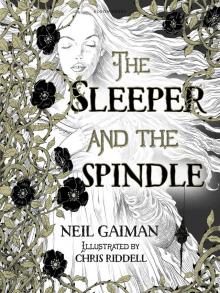 The Sleeper and the Spindle
The Sleeper and the Spindle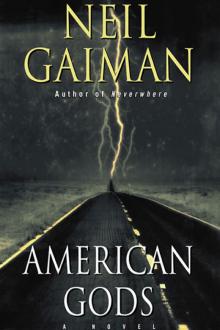 American Gods
American Gods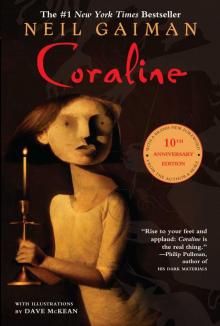 Coraline
Coraline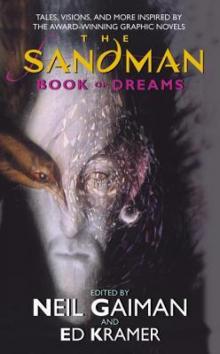 The Sandman: Book of Dreams
The Sandman: Book of Dreams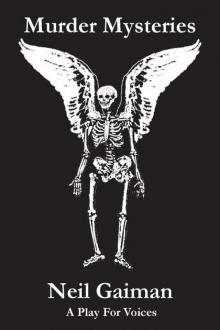 Murder Mysteries
Murder Mysteries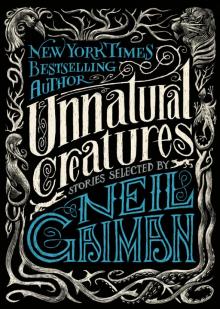 Unnatural Creatures
Unnatural Creatures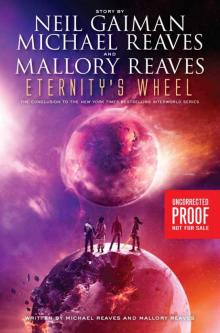 Eternity's Wheel
Eternity's Wheel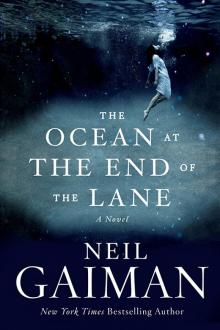 The Ocean at the End of the Lane
The Ocean at the End of the Lane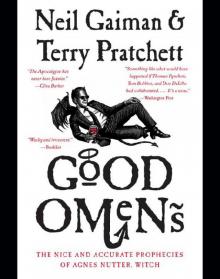 Good Omens
Good Omens Stardust
Stardust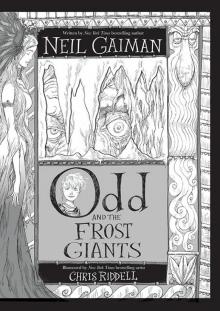 Odd and the Frost Giants
Odd and the Frost Giants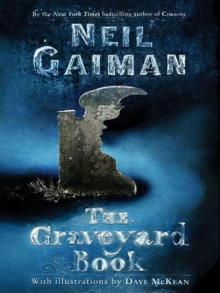 The Graveyard Book
The Graveyard Book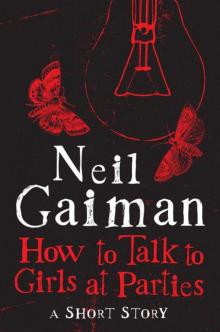 How to Talk to Girls at Parties
How to Talk to Girls at Parties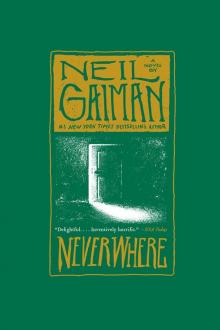 Neverwhere
Neverwhere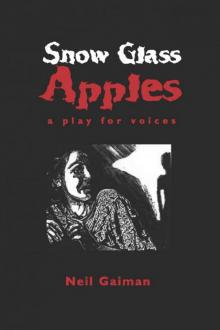 Snow, Glass, Apples
Snow, Glass, Apples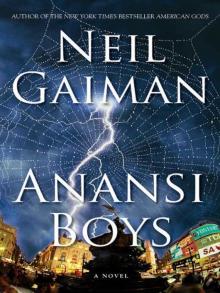 Anansi Boys
Anansi Boys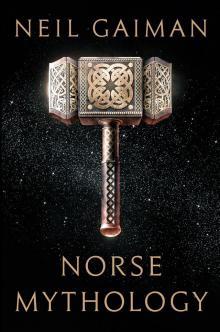 Norse Mythology
Norse Mythology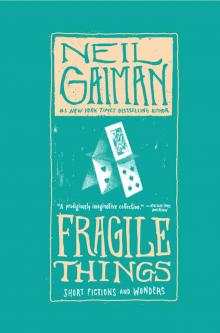 Fragile Things: Short Fictions and Wonders
Fragile Things: Short Fictions and Wonders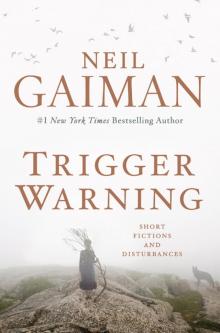 Trigger Warning: Short Fictions and Disturbances
Trigger Warning: Short Fictions and Disturbances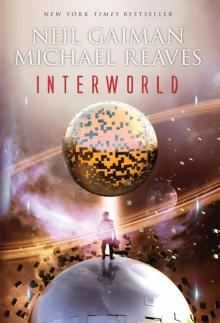 InterWorld
InterWorld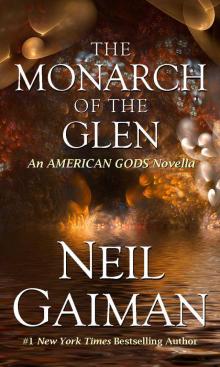 The Monarch of the Glen
The Monarch of the Glen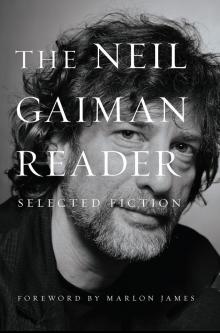 The Neil Gaiman Reader
The Neil Gaiman Reader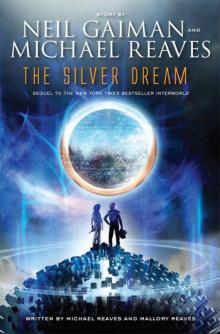 The Silver Dream
The Silver Dream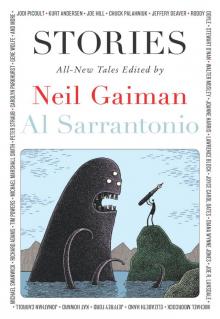 Stories
Stories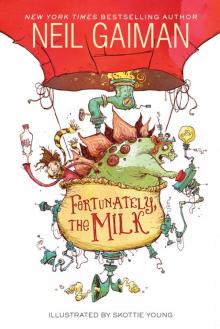 Fortunately, the Milk
Fortunately, the Milk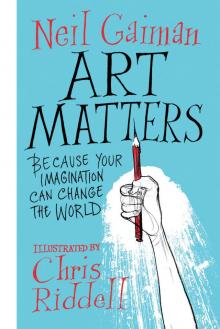 Art Matters
Art Matters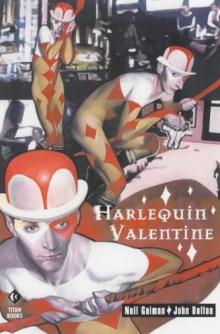 Harlequin Valentine
Harlequin Valentine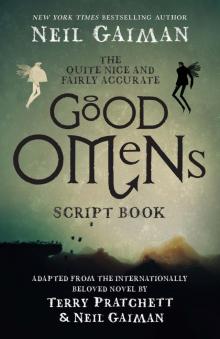 The Quite Nice and Fairly Accurate Good Omens Script Book
The Quite Nice and Fairly Accurate Good Omens Script Book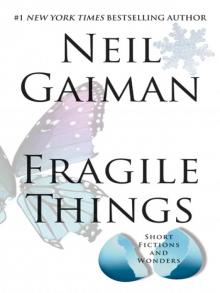 Fragile Things
Fragile Things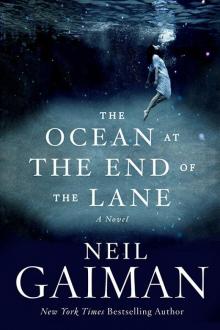 The Ocean at the End of the Lane: A Novel
The Ocean at the End of the Lane: A Novel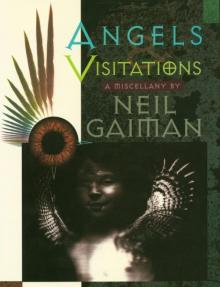 Angels and Visitations
Angels and Visitations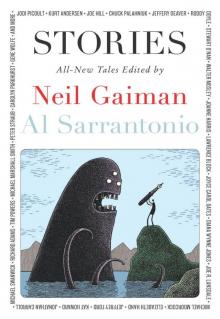 Stories: All-New Tales ngss-1
Stories: All-New Tales ngss-1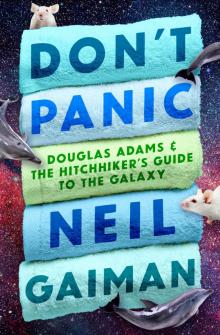 Don't Panic
Don't Panic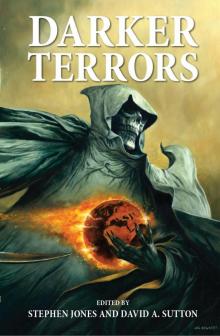 Darker Terrors
Darker Terrors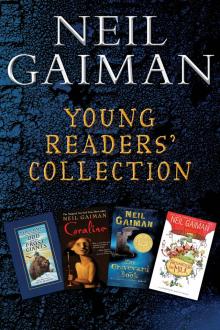 Neil Gaiman Young Readers' Collection
Neil Gaiman Young Readers' Collection A Study In Emerald
A Study In Emerald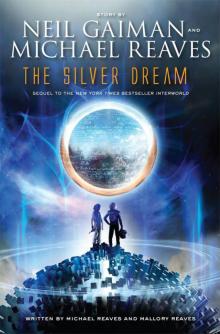 The Silver Dream: An InterWorld Novel
The Silver Dream: An InterWorld Novel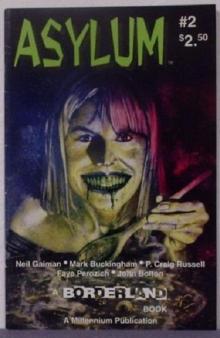 Feeders and Eaters
Feeders and Eaters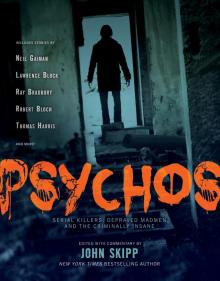 Psychos
Psychos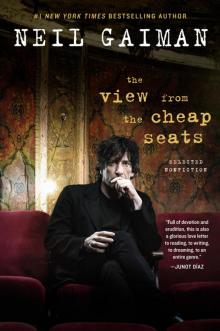 The View from the Cheap Seats
The View from the Cheap Seats Trigger Warning
Trigger Warning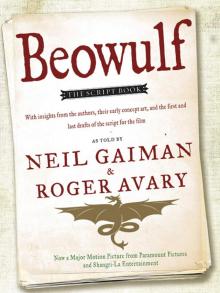 Beowulf
Beowulf Nessun Dove
Nessun Dove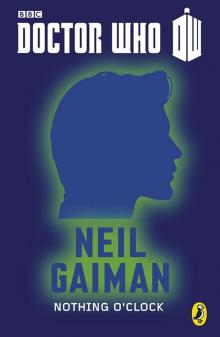 Doctor Who: Nothing O'Clock: Eleventh Doctor: 50th Anniversary
Doctor Who: Nothing O'Clock: Eleventh Doctor: 50th Anniversary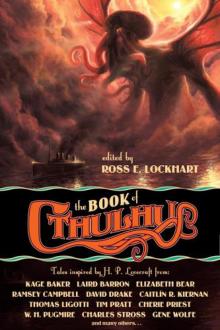 The Book of Cthulhu
The Book of Cthulhu